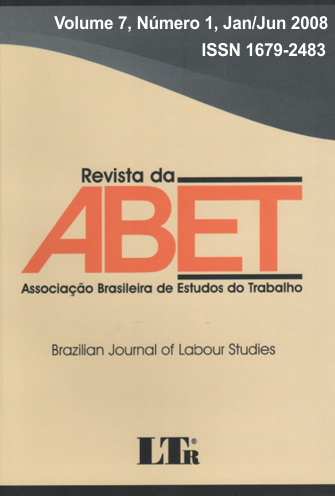IMPACTOS DO PROGRAMA BOLSA FAMÍLIA SOBRE OS GASTOS COM ALIMENTOS DE FAMÍLIAS RURAIS
Resumo
Programas de transferência condicionada de renda são políticas sociais correntemente empregadas para combater e reduzir a pobreza em diversos países. A finalidade desses programas no curto prazo é aliviar os problemas decorrentes da situação de pobreza e, no longo prazo, investir no capital humano, quebrando o ciclo intergeracional da pobreza. Trabalhos têm sido realizados para avaliar os impactos desses programas sobre variáveis como freqüência escolar, trabalho infantil, gastos com alimentação, entre outros. Este trabalho tem como objetivo avaliar o impacto da transferência de renda do Programa Bolsa Família sobre os gastos com alimentos de famílias rurais. As estimações foram realizadas com a utilização do método de Propensity Score, que corrige para o viés de seleção amostral. Os resultados mostram que o valor médio das despesas anuais para as famílias beneficiárias é cerca de 240 reais superior à média dos gastos totais das famílias não participantes. Considerando que o valor médio anual recebido por estas famílias é de R$ 278, pode-se inferir que cerca de 87% deste valor é utilizado para consumo de alimento. Portanto, o programa de transferência condicionada Bolsa Família exerce um impacto positivo sobre o consumo de alimentos dessas famílias selecionadas.
Downloads
Downloads
Publicado
Como Citar
Edição
Seção
Licença
Política de Acesso Livre
Esta revista oferece acesso livre imediato ao seu conteúdo, seguindo o princípio de que disponibilizar gratuitamente o conhecimento científico ao público proporciona maior democratização mundial do conhecimento.
Atribuição dos artigos é não comercial (sem derivações 4.0, isto é, Creative Commons) e o acesso é livre e gratuito para download e leitura.
Não há taxa para submissão, avaliação e publicação de artigos.
Copyright
1) Os artigos são de responsabilidade exclusiva dos autores. É permitida sua reprodução, total ou parcial desde que seja citada a fonte.
2) Os trabalhos enviados para publicação devem ser inéditos, não sendo permitida sua apresentação simultânea em outro periódico nacional.
3) Os artigos são submetidos a pareceristas "ad hoc", após prévia avaliação da Comissão Editorial, os quais podem aceitar, recusar ou reapresentar o original ao autor com sugestões para alterações. Os nomes dos pareceristas permanecem em sigilo, bem como os nomes dos autores.
Os Autores que publicam nesta revista concordam com os seguintes termos:
Autores mantêm os direitos autorais e concedem à revista o direito de primeira publicação, com o trabalho simultaneamente licenciado sob a Creative Commons Attribution License, permitindo o compartilhamento do trabalho com reconhecimento da autoria do trabalho e publicação inicial nesta revista.
Autores têm autorização para assumir contratos adicionais separadamente, para distribuição não-exclusiva da versão do trabalho publicada nesta revista (ex.: publicar em repositório institucional ou como capítulo de livro), com reconhecimento de autoria e publicação inicial nesta revista.
Autores têm permissão e são estimulados a publicar e distribuir seu trabalho online (ex.: em repositórios institucionais ou na sua página pessoal), já que isso pode gerar alterações produtivas, bem como aumentar o impacto e a citação do trabalho publicado.
Patrocinador
A publicação recebe financiamento da Associação Brasileira de Estudos do Trabalho.










